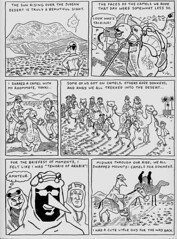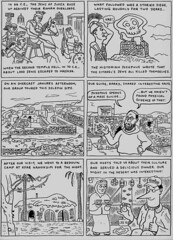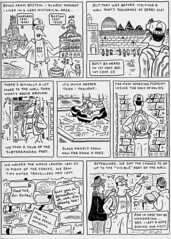Larry Summers has seen better winters. After delivering some ill-received remarks at a conference in Washington, DC, the Harvard president is facing uproar among the university's faculty, students and alumni. On Tuesday, the faculty will meet to discuss a symbolic vote of no confidence in Summers.
The former Treasury secretary under President Clinton has experienced a tempestuous tenure since he took over for Neil Rudenstine in 2001. A much-publicized flap with Afro-American studies professor Cornel West led to West's departure for Princeton that fall. A year later, Summers, speaking at morning prayers at University Church, said that critics of Israel are "anti-Semitic in effect if not in intent." He has also voiced his support for the Harvard ROTC program, which has been banned from the university since 1969.
And now, this contretemps. Responding to his critics' demands, Summers has issued a transcript of his remarks, as
The Crimson reports. You can read those remarks
here. It's time to ask the question: How severe are Summers' remarks?
Let's take a look at them. Summers was speaking at a conference of the National Bureau of Economic Research to deal with "the issue of women's representation in tenured positions in science and engineering at top universities and research institutions," he said. Summers called women in science an example of "a group that is significantly underrepresented in an important activity and whose underrepresentation contributes to a shortage of role models for others who are considering being in that group."
Summers listed three hypotheses as to why the problem of women's underrepresentation in science exists. The most important, he said, was the demanding schedule required for a career in the sciences. "And it is a fact about our society that that is a level of commitment that a much higher fraction of married men have been historically prepared to make than of married women," Summers said. "That's not a judgment about how it should be, not a judgment about what they should expect. But it seems to me that it is very hard to look at the data and escape the conclusion that that expectation is meeting with the choices that people make and is contributing substantially to the outcomes that we observe."
The second most important hypothesis, according to Summers, was a mixture of genetic makeup and cultural conditioning. "It does appear that on many, many different human attributes -- height, weight, propensity for criminality, overall IQ, mathematical ability, scientific ability -- there is relatively clear evidence that whatever the difference in means -- which can be debated -- there is a difference in the standard deviation, and variability of a male and a female population," he said. "And that is true with respect to attributes that are and are not plausibly, culturally determined." It seems he proposed that gender differences may be innate: he used his twin two-year-old daughters as evidence; given trucks to play with, they began calling them "daddy truck" and "baby truck."
Lastly, Summers considered the role of discrimination. While Summers said that "it is something that happens, and it is something that absolutely, vigorously needs to be combated," he added two points: first, he said, "there's a real question as to how plausible it is to believe that there is anything like half as many people who are qualified to be scientists at top ten schools and who are now not at top ten schools," and second, "if there was really a pervasive pattern of discrimination that was leaving an extraordinary number of high-quality potential candidates behind, one suspects that in the highly competitive academic marketplace, there would be more examples of institutions that succeeded substantially by working to fill the gap."
Summers couched these proposals in careful language, but they have nevertheless angered many. Is the anger justified? Answering this question requires a consideration of the roles of both academic discourse, and of a university president.
First, academic discourse. Like it or not, academic discourse is supposed to be impartial: as Harvard professor
Steven Pinker pointed out in the New Republic, "the ideal of scholarship" is "that any idea is worth thinking about, if only to determine whether it is wrong." However, as human beings, we cannot detach ourselves from thinking passionately about a particular issue. Often, this issue may relate to one's background; for instance, race and ethnicity. In the 1960s, African-American students requested black studies departments on campuses. Today, Muslim and Jewish students debate (sometimes heatedly) the Israel-Palestine dilemma. Gender, we have seen, is also a polarizing issue: the "Coalition for an Anti-Sexist Harvard" is calling for, among other things, a Women's Center and more tenured female faculty members.
Were Summers' remarks offensive? Others have said worse, namely former Boston University president John Silber. (Incidentally, this
Boston Magazine article, in addition to citing some of Silber's views, also notes that more women than men are attending college.) That does not excuse Summers, but it is my view that, given his cautious approach in contrast to Silber's stridency, he meant to provoke, not offend.
Certainly, Summers has done both, and the final fallout may be harsh for him, professionally and personally. Professors have more latitude as far as being controversial; Harvard government professor Harvey Mansfield has criticized, among other groups, anti-apartheid protestors and the politically-correct crowd, and he's stuck around. Summers, though, is the head of a university, entrusted with the task of attracting and educating quality candidates, men and women. His comments may turn off prospective students. (Then again, they may not; can anything dim Harvard's reputation?) In that respect, he spoke unwisely.
A concluding thought: I'm not a woman, so I can't pretend to speak from a female perspective. If I was, perhaps my opinion on this issue would be considerably more heated. (What would
Virginia Woolf have thought?) I would like to think I could still step back and evaluate Summers' statements on their merits, and then conclude that he spoke inappropriately but not maliciously.




